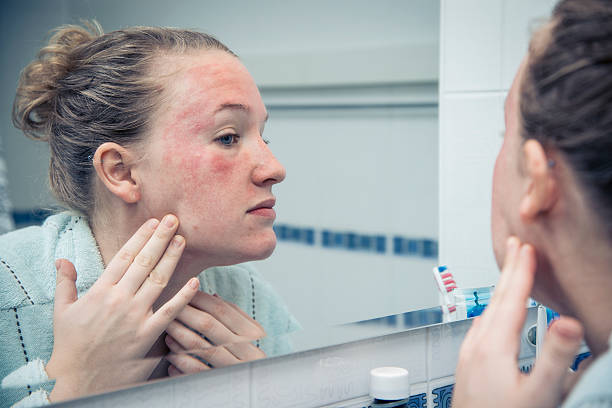Do you ever look in the mirror and wonder, What’s going on with my skin? If so, you’re not alone! Most people experience skin problems at some point in their lives. Common skin conditions like Acne, Rosacea, and Eczema affect millions of people. And while some of these conditions can be treated with medication, many can be managed with lifestyle changes.
So, if you’re looking for a little guidance on how to get your skin in tip-top shape, read on!
In this article, we cover six of the most common skin conditions and how to deal with them.
Table of Contents
Acne
Acne is a common skin condition that can affect people of all ages. It occurs when the hair follicles on the skin become clogged with oil and dead skin cells. This can lead to pimples, blackheads, and other blemishes.
Acne can be caused by several factors, including hormones, diet, stress, and genetics. But the good news is that there are numerous treatment options available that can help to clear up acne and prevent future breakouts.
Symptoms
Common symptoms of acne include blackheads, whiteheads, pimples, and cysts. Blackheads are small, dark bumps that appear on the skin. Whiteheads are similar, but they have a white or yellow centre. Pimples are red bumps that can be painful and may have pus inside. Cysts are large, painful bumps that are filled with pus.
In addition to the physical symptoms, acne can also cause emotional distress.
Treatment options
Several over-the-counter and prescription medications can be used to treat acne. Over-the-counter medications include benzoyl peroxide, salicylic acid, and retinoids. Prescription medications include antibiotics, birth control pills, and isotretinoin. It’s important to speak with a dermatologist or other healthcare professional before starting any acne treatment. They can help you choose the right medication and create a treatment plan that’s right for you.
Prevention
There are a few things you can do to help prevent acne from occurring in the first place. One of the most essential things is to keep your skin clean. Wash your face twice a day with a gentle cleanser. Avoid scrubbing your skin, as this can irritate it and make acne worse. Be sure to remove all makeup before going to bed. And use oil-free, non-comedogenic products whenever possible. Also, try to keep your hair off your face, as it can transfer oil and dirt to your skin.
Rosacea
Rosacea is a common skin condition that causes redness and swelling on the face. According to Healthline, Rosacea is a chronic skin disease that affects more than 16 million Americans. The cause of rosacea is still unknown, and there is no cure. However, research has allowed doctors to find ways to treat the condition by minimizing its symptoms.
Symptoms
Symptoms of rosacea can range from mild to severe. Common symptoms include flushing, redness, broken blood vessels, and bumps that look like acne.
In severe cases, rosacea can cause thickening of the skin, dry and rough patches, and swelling around the eyes. While there’s no cure for rosacea, there are treatments that can help reduce the severity of symptoms.
Topical medications like metronidazole and azelaic acid can help reduce redness, bumps, and other symptoms.
Eczema
Eczema, also known as atopic dermatitis, is a common skin condition that causes dry, itchy, and inflamed skin.
The exact cause of eczema is unknown, but it’s believed to be a combination of genetic and environmental factors.
Symptoms
Symptoms of eczema vary from person to person, but they often include dry, itchy skin, redness, swelling, and small blisters that ooze and crust over. The severity of the symptoms can range from mild to severe. If you have eczema, it’s important to moisturize your skin regularly and avoid triggers that can make your symptoms worse. Triggers can include irritants like soaps and detergents, stress, and temperature changes.
Treatment for eczema can include topical creams, oral medications, and light therapy.
Sunburn
Sunburn is a skin injury that’s caused by too much exposure to the sun. Sunburns can range from mild to severe, and the severity depends on the amount of time you were in the sun, the strength of the sun’s rays, and your skin type.
Sunburn symptoms can include redness, swelling, and pain. In severe cases, it can also cause blistering, peeling, and fever.
Prevention
The best way to prevent sunburn is to avoid prolonged exposure to the sun, especially during the peak hours of 10 am to 2 pm. It is important to wear sunscreens. It’s also a good idea to wear a hat and cover up with loose-fitting clothing.
But if you do get sunburn, there are some things you can do to relieve the pain. It’s essential to stay hydrated and to apply cool compresses or aloe vera gel to the affected area.
Melasma
Melasma is a common skin condition that causes brown or greyish-brown patches on the skin. It’s most common in women and is often triggered by hormonal changes, like pregnancy or birth control pills. Melasma is also more common in people with darker skin tones.
As noted by Cleveland Clinic, It’s often called the “mask of pregnancy.” Melasma happens because of the overproduction of the cells that make the colour of your skin. It is common and harmless and some treatments may help.

While there’s no cure for melasma, there are treatments that can help to lighten the skin and reduce the appearance of the patches. These include topical creams, laser therapy, and chemical peels.
If you have melasma, be sure to avoid:
- Hormone treatments, specifically ones that involve estrogen.
- Birth control, specifically oral contraceptive pills that contains estrogen and progesterone.
- LED light from your television, laptop, cell phone and tablet.
- Makeup you find irritating to your skin.
- Medications that may cause or worsen melasma.
- Scented soaps.
- Skin care products that irritate your skin.
- Tanning beds.
- Waxing, which can aggravate the melasma.
Skin Ageing
As we age, our skin naturally begins to lose its elasticity and firmness. This can lead to wrinkles, sagging skin, and age spots. But there are things you can do to prevent or reduce the signs of skin ageing.
Treatments
These include using sunscreen, avoiding excessive sun exposure, eating a healthy diet, and quitting smoking.
You can also try using anti-ageing skin care products that contain retinol or other antioxidants. And don’t forget to drink plenty of water to keep your skin hydrated.
Home remedies to prevent skin condition
- Keep a skincare diary to track triggers and flare-ups.
- Wash your face twice daily with a mild cleanser.
- Don’t scrub your skin too hard.
- Apply an over-the-counter benzoyl peroxide cream to acne-prone areas.
- Avoid picking at your acne, as this can lead to scarring.
- Try a natural acne treatment, like tea tree oil.
- Use a gentle cleanser, moisturizer, and sunscreen
- Moisturizing your skin with an oil-based cream.
- Taking short, warm baths with a mild cleanser.
- Applying cold compresses to the affected area.
- Applying a topical steroid cream to help reduce inflammation.
- Avoid irritants like soaps, perfumes, and harsh detergents.
Remember that it’s always best to talk to a dermatologist if you’re experiencing any skin concerns. Meanwhile, using these simple home remedies can make a big difference in the health and appearance of your skin.
Photo Credit: Pexels


























